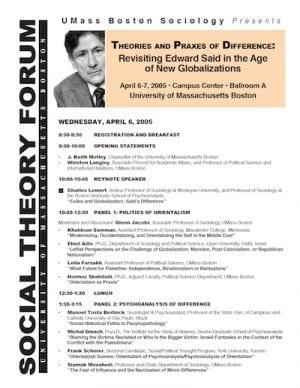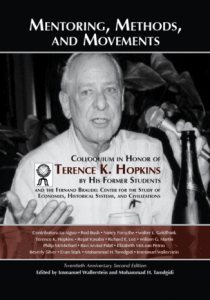Proceedings Journal Article — The Great Dis-Orientator: Edward Said — by Winston Langley
$15.00
Edward Said understood the powerful need to which Fromm referred; he understood even more deeply, the witting and unwitting ways—note his work Culture and Imperialism (1994)—by which culture is used as a map to shape orientation, by which one’s social, political, aesthetic, and moral outlook become hinged to that orientation, and the construction of identities based on that hinging. He, therefore, became the great dis-orientator, as he witnessed the building of empires of meaning based on those images, as he countenanced the humiliation and undoing of cultures and peoples, and as he faced the progressive denuding of the everything human of individuals and societies.
Description
Abstract
Fromm suggested that our capacity for self-awareness, reasoning, and imagination requires a picture of the world, requires images. Second, that satisfying this requirement permits one to organize all the impressions that impinge on one and provides a basis to act purposefully, whether or not the content of those images is false. Third, this need for images is not a historical or contingent one; it is universal and trans-historical. Edward Said understood the powerful need to which Fromm referred; he understood even more deeply, the witting and unwitting ways—note his work Culture and Imperialism (1994)—by which culture is used as a map to shape orientation, by which one’s social, political, aesthetic, and moral outlook become hinged to that orientation, and the construction of identities based on that hinging.
He, therefore, became the great dis-orientator, as he witnessed the building of empires of meaning based on those images, as he countenanced the humiliation and undoing of cultures and peoples, and as he faced the progressive denuding of the everything human of individuals and societies. Orientalism (1979), as well as Culture and Imperialism—to cite two of his works—were efforts to dis-orient people; to reverse centuries of false devotions, fears, and loyalties; and to awaken the world and its generations of people to the cruel truth that the self itself is constituted in the activity of making and moving among images. As such, the great dis-orientator, knew that it is not enough that the intellect identifies and wrestles with the defects and evils of our or any age or—indeed—the culmination of ages. It is not even enough to identify the instrumental remedies for those evils. What we must do is nothing less than become what we truly are—humans.
To so become, we need to eliminate the hierarchies withinourselves—as individuals and collectivities—between word and deed; and then begin the work of eliminating other hierarchies of race, ethnicity, religion, gender, social class, cultural status, among others. Finally, the dis-orientator warns us about tomorrow—the history we imagine, the promise of the better. That promise is an orientation, also, that allows for present brutalities. So he told us that no moment holdsmore promise than the one we have; do not privilege tomorrow. Now is the accepted time. Let us begin.
Recommended Citation
Langley, Winston. 2005. “The Great Dis-Orientator: Edward Said.” Pp. 3-4 in Theories and Praxes of Difference: Revisiting Edward Said in the Age of New Globalizations: Proceedings of the Second Annual Social Theory Forum, April 6-7, 2005 (Discourse of Sociological Practice, Vol. 7, Issues 1&2, Fall/Spring 2005). Double-Issue Guest Editor: Mohammad H. Tamdgidi. Sociology Department, UMass Boston.
Read the Above Publication Online
To read the above publication online, you need to be logged in as an OKCIR Library member with a valid access. In that case just click on the large PDF icon below to access the publication. Make sure you refresh your browser page after logging in.






